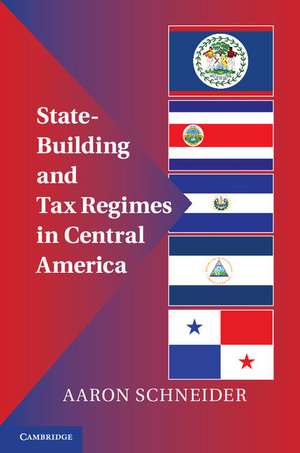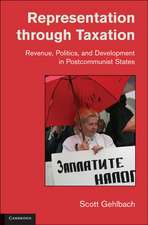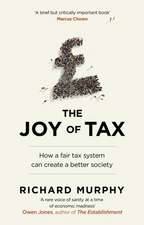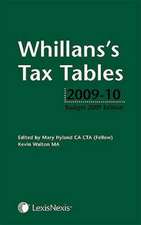State-Building and Tax Regimes in Central America
Autor Aaron Schneideren Limba Engleză Hardback – 11 mar 2012
| Toate formatele și edițiile | Preț | Express |
|---|---|---|
| Paperback (1) | 284.98 lei 43-57 zile | |
| Cambridge University Press – 27 sep 2017 | 284.98 lei 43-57 zile | |
| Hardback (1) | 717.71 lei 43-57 zile | |
| Cambridge University Press – 11 mar 2012 | 717.71 lei 43-57 zile |
Preț: 717.71 lei
Preț vechi: 834.54 lei
-14% Nou
Puncte Express: 1077
Preț estimativ în valută:
137.33€ • 143.77$ • 113.63£
137.33€ • 143.77$ • 113.63£
Carte tipărită la comandă
Livrare economică 07-21 aprilie
Preluare comenzi: 021 569.72.76
Specificații
ISBN-13: 9781107019096
ISBN-10: 1107019095
Pagini: 260
Ilustrații: 11 b/w illus. 25 tables
Dimensiuni: 158 x 233 x 18 mm
Greutate: 0.48 kg
Editura: Cambridge University Press
Colecția Cambridge University Press
Locul publicării:New York, United States
ISBN-10: 1107019095
Pagini: 260
Ilustrații: 11 b/w illus. 25 tables
Dimensiuni: 158 x 233 x 18 mm
Greutate: 0.48 kg
Editura: Cambridge University Press
Colecția Cambridge University Press
Locul publicării:New York, United States
Cuprins
1. Revenues, states, and Central America; 2. State-building in a globalized political economy; 3. Historical junctures in Central American state-building and tax; 4. 1990s transnational integration: quantitative evaluation of socioeconomic actors, democratic institutions, and tax regimes; 5. Inside-out state-building in El Salvador: dominant and cohesive transnational elites; 6. Outside-in state-building in Honduras: dominant but divided transnational elites; 7. Crisis in Guatemalan state-building: divided, subordinate transnational elites; 8. Conclusion: state-building and tax in developing countries.
Recenzii
“Central American countries have increased their tax-to-GDP ratio by an average of more than 33% since they started their transition to democracy two decades ago. In spite of sustained efforts, they still collect an average of 30% to 45% less than South American and OECD countries, respectively. This book provides excellent political economy insights to achieve successful tax reform, in a context where mobilizing additional fiscal revenues pari passu with an efficient provision of public goods is crucial for development.” — Alberto Barreix, Principal Fiscal Economist, Inter-American Development Bank
“Taxes are about much more than dollars and sense. As Aaron Schneider astutely reveals, fiscal policies illuminate underlying domestic power structures, and in today's world, underscore the tight constraints placed on governments—strictures which are especially severe for small states. But this masterpiece of international political economy will be of tremendous interest well beyond Central America: all those seeking to better understand how globalization impacts lesser states everywhere will find Schneider’s book a must-read.” — Richard Feinberg, University of California, San Diego
“Aaron Schneider explains with great clarity the specific political strategies or paths followed in Central American countries in order to implement tax reforms and strengthen the state. Anyone interested in the comparative analysis of the interaction of fiscal policy, conflict, state building and globalization should read this book.” — Juan Alberto Fuentes Knight, former Minister of Finance of Guatemala
“This analytically ambitious and empirically thorough comparative study represents a dramatic and much needed advance in research on contemporary Central American political economy. Anchored in recognition of often overlooked transformations of the region’s economies and their impact on the configuration of elites, Aaron Schneider’s book underscores how patterns of taxation are shaping the contours of states, and distributional outcomes, in highly unequal societies in which revenue constraints hinder efforts to consolidate stable democratic institutions. The insights he puts forth are invaluable for scholars and practitioners seeking to understand the challenges to state-building that confront fledgling democracies in Central America and beyond.” — Eric Hershberg, American University
“Nearly one hundred years ago, Joseph Schumpeter put the question of the underpinning of tax capacity on the agenda for political science and sociological research. Despite the fact that taxation has come to play a central theoretical role in discussions of state building since that time, far too little is known about its contemporary underpinnings. Schneider’s State-Building and Tax Regimes in Central America is a major step forward on this front, weaving a compelling argument that combines the impact of globalization with domestic social and institutional conditions to provide an account of success and failure in the construction of an effective revenue state. This is compelling work on a region that is under-studied, but all-too-typical of much of the less-developed world.” — Marcus Kurtz, The Ohio State University
“Aaron Schneider’s exciting new book provides the field of Central American politics just what it needs: a classification and explanation of national differences in state building that have emerged in the recent era of globalization. Drawing on much original research and a nuanced historical perspective, Schneider convincingly argues that differences in the form of transnational elites fostered striking variations in state-building projects and tax regimes within Central America. This provocative analysis is essential reading for anyone interested in making sense of contemporary Central America.” — James Mahoney, Northwestern University
“How to raise taxes to fund public policy constitutes a major challenge for all developing countries. Professor Schneider offers an outstanding interpretation of why some countries have been more successful than others in meeting it. Based on a comparative study of the recent experience in El Salvador, Guatemala and Honduras, he shows how the power and cohesion of the new transnational elite determines the nature of tax reforms. Countries like El Salvador where the elite is cohesive and dominates the process of policy making are more likely to expand taxes than others—even if through regressive means. By studying the tax system, Professor Schneider also offers a new understanding of the process of state building in small countries in the era of globalization. This book is political economy as its best.” — Diego Sánchez-Ancochea, University of Oxford
“Of the many questions about the history of Central America, the fiscal aspect is one of the most important. The construction of the National State and its operation cannot be understood without looking at institutions and fiscal policies, the tax system, and state resources, both historically and today. Professor Schneider’s ambitious work is of the utmost importance; it is probably the first work on this subject, with the additional merit of referring to Central America. It is both historical and current. This is a valuable book, which I enthusiastically recommend for anyone wishing to better understand this region.” — Edelberto Torres-Rivas, United Nations Development Programme
“State-Building and Tax Regimes in Central America offers several important contributions. First, it represents the most robust analysis of tax policy in Central America to date. Second, and more generally, Schneider advances our knowledge of the political economy of globalization, especially the ways in which it influences specific policy outputs. Finally, by focusing on the myriad actors and institutions that play a role in shaping political processes, this book will resonate with readers and researchers whose interests extend far beyond tax policy in Central America.” -Matthew A. Johnson, Tulane University, Comparative Political Studies
“Taxes are about much more than dollars and sense. As Aaron Schneider astutely reveals, fiscal policies illuminate underlying domestic power structures, and in today's world, underscore the tight constraints placed on governments—strictures which are especially severe for small states. But this masterpiece of international political economy will be of tremendous interest well beyond Central America: all those seeking to better understand how globalization impacts lesser states everywhere will find Schneider’s book a must-read.” — Richard Feinberg, University of California, San Diego
“Aaron Schneider explains with great clarity the specific political strategies or paths followed in Central American countries in order to implement tax reforms and strengthen the state. Anyone interested in the comparative analysis of the interaction of fiscal policy, conflict, state building and globalization should read this book.” — Juan Alberto Fuentes Knight, former Minister of Finance of Guatemala
“This analytically ambitious and empirically thorough comparative study represents a dramatic and much needed advance in research on contemporary Central American political economy. Anchored in recognition of often overlooked transformations of the region’s economies and their impact on the configuration of elites, Aaron Schneider’s book underscores how patterns of taxation are shaping the contours of states, and distributional outcomes, in highly unequal societies in which revenue constraints hinder efforts to consolidate stable democratic institutions. The insights he puts forth are invaluable for scholars and practitioners seeking to understand the challenges to state-building that confront fledgling democracies in Central America and beyond.” — Eric Hershberg, American University
“Nearly one hundred years ago, Joseph Schumpeter put the question of the underpinning of tax capacity on the agenda for political science and sociological research. Despite the fact that taxation has come to play a central theoretical role in discussions of state building since that time, far too little is known about its contemporary underpinnings. Schneider’s State-Building and Tax Regimes in Central America is a major step forward on this front, weaving a compelling argument that combines the impact of globalization with domestic social and institutional conditions to provide an account of success and failure in the construction of an effective revenue state. This is compelling work on a region that is under-studied, but all-too-typical of much of the less-developed world.” — Marcus Kurtz, The Ohio State University
“Aaron Schneider’s exciting new book provides the field of Central American politics just what it needs: a classification and explanation of national differences in state building that have emerged in the recent era of globalization. Drawing on much original research and a nuanced historical perspective, Schneider convincingly argues that differences in the form of transnational elites fostered striking variations in state-building projects and tax regimes within Central America. This provocative analysis is essential reading for anyone interested in making sense of contemporary Central America.” — James Mahoney, Northwestern University
“How to raise taxes to fund public policy constitutes a major challenge for all developing countries. Professor Schneider offers an outstanding interpretation of why some countries have been more successful than others in meeting it. Based on a comparative study of the recent experience in El Salvador, Guatemala and Honduras, he shows how the power and cohesion of the new transnational elite determines the nature of tax reforms. Countries like El Salvador where the elite is cohesive and dominates the process of policy making are more likely to expand taxes than others—even if through regressive means. By studying the tax system, Professor Schneider also offers a new understanding of the process of state building in small countries in the era of globalization. This book is political economy as its best.” — Diego Sánchez-Ancochea, University of Oxford
“Of the many questions about the history of Central America, the fiscal aspect is one of the most important. The construction of the National State and its operation cannot be understood without looking at institutions and fiscal policies, the tax system, and state resources, both historically and today. Professor Schneider’s ambitious work is of the utmost importance; it is probably the first work on this subject, with the additional merit of referring to Central America. It is both historical and current. This is a valuable book, which I enthusiastically recommend for anyone wishing to better understand this region.” — Edelberto Torres-Rivas, United Nations Development Programme
“State-Building and Tax Regimes in Central America offers several important contributions. First, it represents the most robust analysis of tax policy in Central America to date. Second, and more generally, Schneider advances our knowledge of the political economy of globalization, especially the ways in which it influences specific policy outputs. Finally, by focusing on the myriad actors and institutions that play a role in shaping political processes, this book will resonate with readers and researchers whose interests extend far beyond tax policy in Central America.” -Matthew A. Johnson, Tulane University, Comparative Political Studies
Notă biografică
Descriere
Explores the politics of raising revenue from the most dynamic sectors of an economy as an expression of the relationship between state and society, and the capacity of state institutions.







